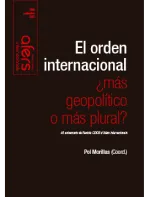Order in transition and rules under challenge

Esther Barbé, investigadora asociada sénior, Institut Barcelona d’Estudis Internacionals (IBEI); catedrática, Universitat Autònoma de Barcelona. ebarbe@ibei.org. ORCID:https://orcid.org/0000-0003-1968-2083
«Norm shifts are to ideational theorist what
changes in the balance of power are to the realists»
(Finnemore y Sikkink, 1998)
The liberal international order established after the end of the Cold War is currently an order in transition. The shift in material power – following the rise of China – is necessary to understanding the changes in the international order, but it is not the whole story. We are seeing both material and ideational changes. The present moment is one of rules under challenge. But the normative contestation the international order is facing is not just about the rivalry between China and the United States or the tired description of “the rest against the West”; its parameters are more complex and diverse. To demonstrate that, this paper looks at three very different issues on the international agenda: a) governance of the Internet, b) sexual and reproductive rights and c) migration management.
Key words: international order, normative contestation, geopolitics, Internet, sexual and reproductive rights, migration
How to cite this article: Barbé, Esther. «Orden en transición y normas en discusión». Revista CIDOB d’Afers Internacionals, n.º 134 (septiembre de 2023), p. 21-36. DOI: doi.org/10.24241/rcai.2023.134.2.21
Este texto se inscribe en el marco del proyecto EUSOV: «La emergencia de la soberanía europea en un mundo de rivalidad sistémica: autonomía estratégica y consensos permisivos», financiado por el Ministerio de Ciencia e Innovación (PDI 2020-116443GB-I00).
Revista CIDOB d’Afers Internacionals, nº 134, p. 21-36
Cuatrimestral (mayo-septiembre 2023)
ISSN:1133-6595 | E-ISSN:2013-035X
DOI: doi.org/10.24241/rcai.2023.134.2.21
>> The full text articles of this issue are available only in Spanish language